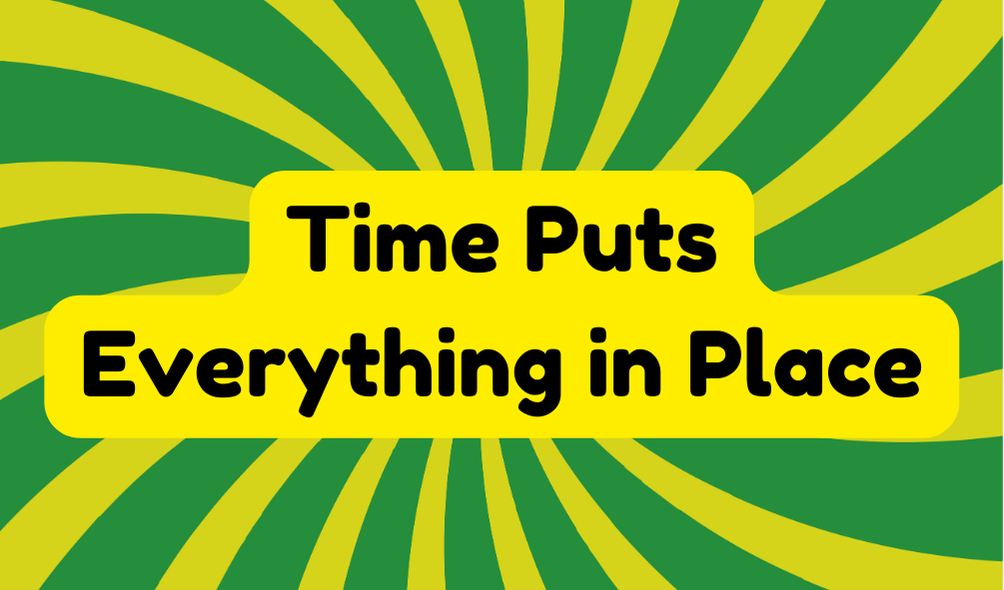The phrase "time puts everything in its place" suggests that healing and clarity come with patience. It acknowledges that emotional recovery isn't instant; it varies for each person. For instance, after a breakup, time might help you see the situation more clearly and regain happiness. However, some issues might linger despite time passing. This saying connects to how cultures view healing and growth. Even today, it holds relevance as people face challenges that test their resilience. Accepting time's role in healing can help you understand your journey better. There's much more to explore about the impact of time on our lives.
Synonyms
When exploring synonyms for the phrase "time puts everything in its place," one can find expressions like "time heals all wounds" that embody a similar sentiment. Delving into synonyms exploration and phrase variations reveals how we often cling to these ideas. However, the reality is that not every situation resolves itself purely with time. Consider these points:
- Healing isn't instantaneous; it requires patience.
- Clarity emerges, but it may take longer than expected.
- Restoration processes impact everyone differently.
- Problems can linger, even as time progresses.
While it's comforting to repeat these phrases, acknowledging the complexity of emotions in life's challenges is essential. They can provide hope, but they shouldn't mask the need for active engagement in your healing journey.
Example of Sentences
Time's unique ability to mend wounds often finds expression in personal anecdotes that illustrate its restorative power. You might wonder how exactly this works in real life. Consider these examples:
- After a painful breakup with Judy, you realize that time eventually restores relationships more than you thought.
- Your new relationship shines a light on happiness, reinforcing the idea that time helps resolve emotional healing.
- Landing your dream job after six long years signals that perseverance pays off, thanks to time's influence.
- Facing marital challenges, you acknowledge that optimism fosters belief in time's healing capacity.
These scenarios remind you that time is essential for relationship restoration. It may feel slow, but the eventual outcome often proves worthwhile.
Origin
You've heard the phrase "time heals all wounds," but have you ever thought about where it comes from? This idiom's origin is tied to several similar expressions across different languages, hinting at its historical context. Its linguistic evolution showcases how societies have sought to articulate the restorative power of time. You might find it interesting that figures like Benjamin Franklin and even Cameron Crowe have referenced this idea. Although one of the earliest printed instances appeared in Soviet literature in 1969, the phrase has undergone changes yet preserved its essence. While it offers comfort, we should remain skeptical; healing often requires more than just time. Understanding this phrase's journey reveals much about our cultural narratives surrounding patience and recovery.
Collocations
Numerous collocations emphasize the relationship between time and healing, enriching the idiom's message. When you explore these phrases, you'll notice how they encapsulate the essence of emotional healing and personal growth. Consider the following:
- Time mends wounds – It highlights the notion that recovery is inevitable.
- Time reveals truths – You gain clarity as moments pass, deepening your understanding.
- Time encourages reflection – With time, you also foster introspection, essential for personal growth.
- Time builds resilience – The setbacks you face strengthen your emotional core.
While these collocations sound comforting, it's crucial to be realistic. Emotional healing takes effort, and you shouldn't just wait for time to work its magic. Embrace your journey actively as you move through life's challenges.
How to Use in Everyday Language
In conversations about life's challenges and emotional healing, you can effortlessly incorporate the phrase "time puts everything in its place." For instance, when a friend shares their struggles after a breakup, you might say, "I know it feels tough now, but remember, time puts everything in its place." This simple, yet powerful expression not only conveys empathy but also reinforces the idea that healing is a gradual process.
| Scenario | Example Phrase | Time Management Tip |
|---|---|---|
| After a breakup | "It takes time to heal." | Prioritize self-care activities. |
| Job search frustrations | "Persistence is key; time will help." | Set deadlines for applications. |
| Family issues | "Understanding grows with time." | Schedule regular family check-ins. |
| Personal goals | "Progress comes gradually." | Track small achievements weekly. |
Why Is It Still Relevant Today?
Throughout history, the phrase "time puts everything in its place" has maintained its resonance because it captures a universal truth about healing and growth. Today, its cultural significance remains strong, especially as we face rapid changes and challenges. Your emotional resilience is often tested, and this phrase serves as a reminder that healing isn't instant; it's a process. While some may scoff at the idea, it's essential to recognize that time offers clarity, guiding us through confusion and turmoil. Change can feel overwhelming, but understanding and acceptance develop gradually. So, rather than dismissing the power of time, consider how it shapes our experiences, allowing you to transform pain into strength and navigate life's complexities with newfound wisdom.







